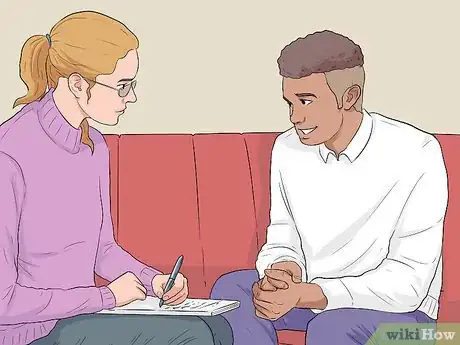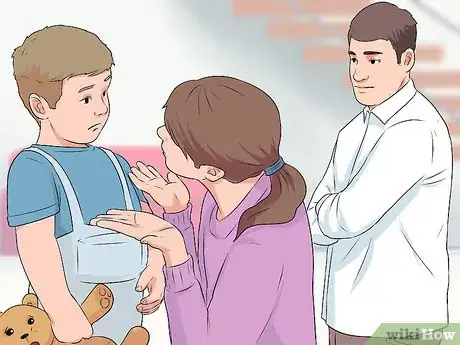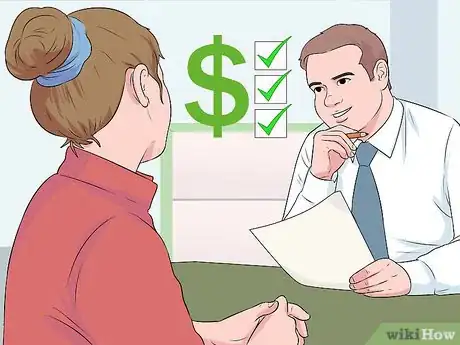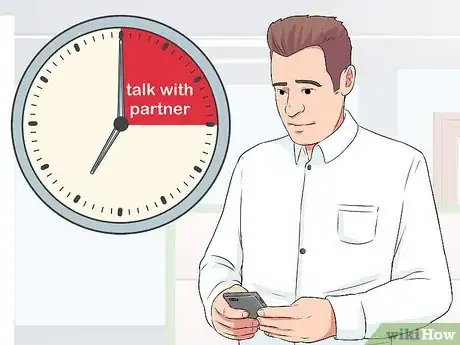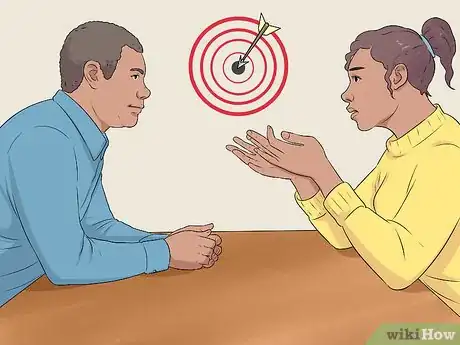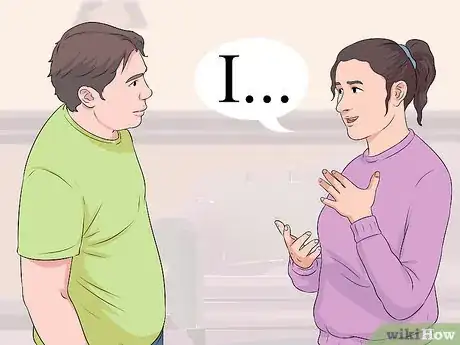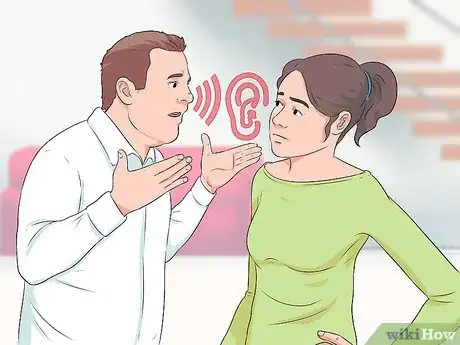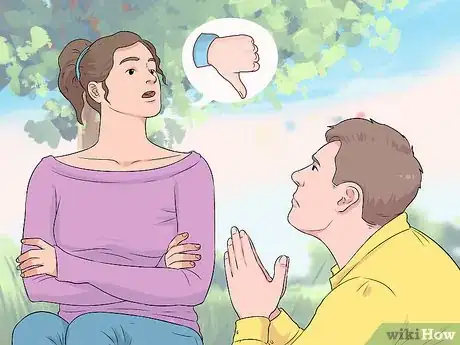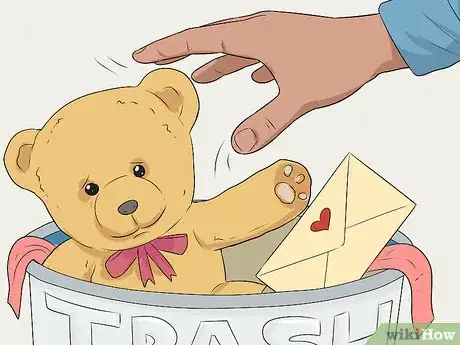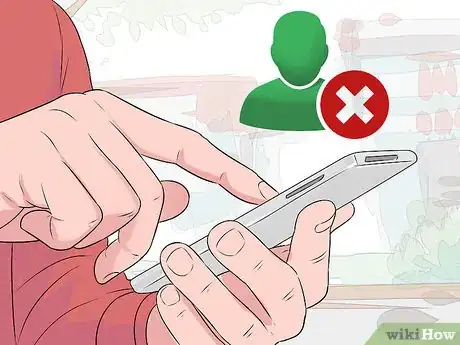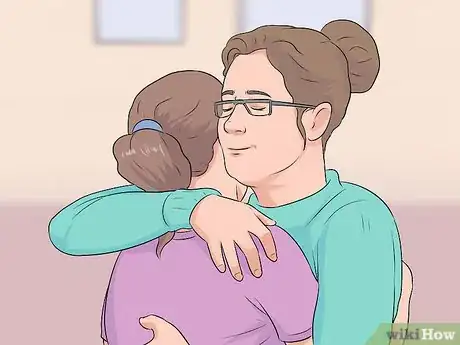This article was co-authored by Klare Heston, LCSW. Klare Heston is a Licensed Independent Clinical Social Worker based in Cleveland, Ohio. With experience in academic counseling and clinical supervision, Klare received her Master of Social Work from the Virginia Commonwealth University in 1983. She also holds a 2-Year Post-Graduate Certificate from the Gestalt Institute of Cleveland, as well as certification in Family Therapy, Supervision, Mediation, and Trauma Recovery and Treatment (EMDR).
There are 15 references cited in this article, which can be found at the bottom of the page.
wikiHow marks an article as reader-approved once it receives enough positive feedback. In this case, 87% of readers who voted found the article helpful, earning it our reader-approved status.
This article has been viewed 341,170 times.
Relationships are one of the most exhilarating aspects of life. Sadly, many love affairs don't end in a happily ever after. Sometimes, circumstances require that you re-evaluate your love and decide to walk away. You can get the courage to walk away from love by thoroughly examining your reasons for doing so. Then, have a talk with your partner before taking action to move on with your life.
Steps
Making the Decision
-
1Wait until you are calm and clear-headed. It's easy to jump to conclusions after a fight or disagreement and think “I don't want this person in my life anymore.” If this describes your situation, give it some time before making a decision. When you are emotional, you are more likely to make rash decisions. Allow yourself time to calm down and fully consider the choice.[1]
- If you are actively angry or upset, take a few deep, calming breaths. Breathe in through your nose and out through your mouth for several counts each.
-
2Reflect on your reasons for wanting to walk away. Once you are more clear-headed, spend some time considering why you want to walk away from love. Has something in particular happened that caused this change of heart? Or, are you acting on a buildup of gut feelings? Write out what you're thinking in a journal to better understand what's guiding your thoughts.[2]
- Common reasons for ending a love relationship may include different dreams or visions for the future, infidelity, abuse, or trouble communicating.
Advertisement -
3Decide how your relationship affects your life and well-being. The ultimate question to ask is “Is my life better because this person is in it?” If the answer is “no,” then you are making the right decision in walking away from love. A healthy relationship should be a positive contribution to your life in general.
- Although every day won't be sunshine and flowers, you should still feel like you are better for knowing your partner. If not, leaving is the best thing you can do for yourself and your future.[3]
-
4Make sure you're not leaving out of fear. In some instances, you may try to walk away from love because you fear being disappointed, hurt, or abandoned. Perhaps you had previous relationships that ended badly and you're afraid of repeating those past mistakes. Or, maybe you aren't sure you can make a long-term relationship work, so you bail before the commitment phase.
- Look deep within yourself to analyze the real reasons you want to walk away from love. If you think fear is driving your desire to end the relationship, voice your concerns with your partner. The two of you may be able to overcome these fears by working together.[4]
-
5Get the advice of a friend or therapist. It may be helpful to seek the opinion of a trusted friend before deciding to walk away from love. This person may be able to weigh in on some of your concerns or reaffirm your choice to walk away.
- Another option is to see a therapist. They can help you work through the pros and cons of leaving your relationship and decide what the right choice is for you.[5]
- Whether you initiated the break up or not, it can feel very painful. The emotional weight of the separation can be particularly difficult if you had been together a long time, developed future plans together, or endured infidelity or abuse. Mental health professionals can help you work through any unresolved emotions.
-
6Examine how your choice affects any children. If you have children with your partner, this probably weighs into your decision to leave. Spend some time thinking about how your leaving will affect them and if it's the best choice.
- If your children are at risk of being abused or if they often witness you and your partner fighting, it may be better for them if you leave.[6]
- Talk it over with a family member, lawyer, or a therapist before making this decision.
- If you do decide to stay, family therapy may help work out the issues in the relationship and the family.
-
7Determine if you can afford to walk away. Another variable keeping you in an unsatisfying relationship is financial difficulty. You may not have money of your own or may not make enough money to sustain a household. If this is the case, discuss your situation with a dear friend or lawyer. Work out a plan to save money and support yourself financially so that you can leave your partner.[7]
- For example, you may need to get a higher-paying job, take on a second job, or stay with a friend or family member for a short time.
Having the Talk
-
1Schedule a time to talk with your partner. Once you have decided to leave your partner, you should set aside a time to talk in person. Let them know that you would like to have a discussion and choose a time that suits both your schedules.
- This type of conversation should probably be set in a public place, just in case your partner reacts negatively.
- In general, you should try to break up in person, unless you feel threatened by your partner in some way. If that's the case, a letter, email, or phone call may be more appropriate.
-
2Be clear about your reasons while also remaining polite. Set out your reasons for ending the relationship in a straightforward way, as doing it in a roundabout fashion often feels worse on the receiving end. Get to the point. Let the person know your decision, but be sure to maintain a pleasant tone.[8]
-
3Use "I" statements. Don't blame the other person or outline their faults. Simply explain how the relationship has affected you and keep the focus on your own needs. Doing so decreases their chances of becoming defensive and disagreeable.[9]
- For instance, you might say, “I care about you and we have shared many wonderful memories together. But I have decided that it's best for me to go my separate way. I've sacrificed my goals and dreams to maintain the relationship and I realized I don't want to do that anymore.”
-
4Listen to their objections. You owe the other person an attentive audience. Don't expect to say what you have to and then scram. Give them the opportunity to voice their grievances. Listen actively and respectfully to what they have to say.[10]
- Resist interrupting or defending yourself or your decision. Also, avoid apologizing, which sends the message that you've done something wrong.
-
5Stand firm in your decision. If your ex tries to convince or even beg you to stay, repeat a condensed version of your previous statement. There's no need to justify your decision or blame yourself for how you feel. Restate your choice firmly and ask the person to respect your decision.[11]
- This might sound like, “As I said, I feel like I have given up my dreams to keep the relationship going. I don't want to do it anymore. I'd appreciate it if you would respect my choice.”
- Meet with the person in public or break up over the phone if you think they might try to harm you. If your partner threatens you or tries to manipulate you into staying in the relationship, leave the environment right away. Call for help, if you are in danger.
Moving On
-
1Get rid of relationship reminders. Holding on to memories of the past will prevent you from being able to move forward. As soon as you're ready, mark a date on your calendar for clearing out the old. Toss or donate any items that remind you of the love you walked away from.[12]
- If you don't trust yourself, ask a friend to box up the items for trash or donation.
-
2Delete your ex's number and other contact info. The next order of business is breaking communication ties with your ex. You decided to walk away from them, so there's no reason to stalk them on social media or send them late-night texts. To prevent yourself from backtracking on your decision, delete all methods of contact.[13]
- Delete their email address as well as unfollowing the person on Facebook, Instagram, Snapchat and any other networks you use.
- If you have kids with this person, simply limit your contact to strictly discussing the children. Avoid being pulled back into communicating about the breakup once the decision has been made.
-
3Get support from loved ones. Breakups are hard. Luckily, you have friends and family members who want to help you get through this troubling time. Take advantage of your close relationships and spend as much time with these people as you can.[14]
- You might ask a dear friend, “Could you hang out with me this weekend? I'm worried I'll be lonely.”
-
4Focus on your dreams. The best way to start dating again is by finding a goal to work towards. This will keep you busy and distracted from dwelling on the breakup, and also gives your life meaning and purpose. Sooner or later, you'll start to feel like yourself again.[15]
- Write out a long-term goal that you'd like to reach within the next year or so. Then, create several short-term goals that help you accomplish it.
- For example, if you aspire to spend six months traveling the world, you might consider short-term goals like finding someone to lease your apartment, taking leave from work or school, and saving money for your travels.
-
5Do self-care activities regularly. Walking away from love is an emotionally upsetting decision, even if you believe it was the right choice. It will take time for you to mourn the person you let go of. In the meantime, take measures to care for yourself mentally, physically, and emotionally.[16]
- Eat balanced, nutritious meals, get plenty of exercise, and aim for at least seven to nine hours of sleep each night. Work to keep stress at bay by practicing relaxation exercises like yoga, writing in a journal, or reading a good book.
-
6Pay attention to your emotions. Notice if your emotions about the break up begin interfering with your ability to complete daily activities or overcome you to the point that you're having difficult coping. These are signs you should seek assistance from a mental health professional to help you get back on your feet.
Expert Q&A
-
QuestionHow do I get out of love?
 Klare Heston, LCSWKlare Heston is a Licensed Independent Clinical Social Worker based in Cleveland, Ohio. With experience in academic counseling and clinical supervision, Klare received her Master of Social Work from the Virginia Commonwealth University in 1983. She also holds a 2-Year Post-Graduate Certificate from the Gestalt Institute of Cleveland, as well as certification in Family Therapy, Supervision, Mediation, and Trauma Recovery and Treatment (EMDR).
Klare Heston, LCSWKlare Heston is a Licensed Independent Clinical Social Worker based in Cleveland, Ohio. With experience in academic counseling and clinical supervision, Klare received her Master of Social Work from the Virginia Commonwealth University in 1983. She also holds a 2-Year Post-Graduate Certificate from the Gestalt Institute of Cleveland, as well as certification in Family Therapy, Supervision, Mediation, and Trauma Recovery and Treatment (EMDR).
Licensed Social Worker You don't necessarily 'get out of love,' but sometimes you must make the decision to leave a relationship that is definitely not working.
You don't necessarily 'get out of love,' but sometimes you must make the decision to leave a relationship that is definitely not working. -
QuestionHow do you get out of a relationship?
 Klare Heston, LCSWKlare Heston is a Licensed Independent Clinical Social Worker based in Cleveland, Ohio. With experience in academic counseling and clinical supervision, Klare received her Master of Social Work from the Virginia Commonwealth University in 1983. She also holds a 2-Year Post-Graduate Certificate from the Gestalt Institute of Cleveland, as well as certification in Family Therapy, Supervision, Mediation, and Trauma Recovery and Treatment (EMDR).
Klare Heston, LCSWKlare Heston is a Licensed Independent Clinical Social Worker based in Cleveland, Ohio. With experience in academic counseling and clinical supervision, Klare received her Master of Social Work from the Virginia Commonwealth University in 1983. She also holds a 2-Year Post-Graduate Certificate from the Gestalt Institute of Cleveland, as well as certification in Family Therapy, Supervision, Mediation, and Trauma Recovery and Treatment (EMDR).
Licensed Social Worker Unless there is danger or abuse, it is usually best to have a conversation (or several) about what is not working in the relationship. Stay calm, use "I" statements, and try not to blame the other person.
Unless there is danger or abuse, it is usually best to have a conversation (or several) about what is not working in the relationship. Stay calm, use "I" statements, and try not to blame the other person. -
QuestionHow do you know when to walk away from a relationship?
 Klare Heston, LCSWKlare Heston is a Licensed Independent Clinical Social Worker based in Cleveland, Ohio. With experience in academic counseling and clinical supervision, Klare received her Master of Social Work from the Virginia Commonwealth University in 1983. She also holds a 2-Year Post-Graduate Certificate from the Gestalt Institute of Cleveland, as well as certification in Family Therapy, Supervision, Mediation, and Trauma Recovery and Treatment (EMDR).
Klare Heston, LCSWKlare Heston is a Licensed Independent Clinical Social Worker based in Cleveland, Ohio. With experience in academic counseling and clinical supervision, Klare received her Master of Social Work from the Virginia Commonwealth University in 1983. She also holds a 2-Year Post-Graduate Certificate from the Gestalt Institute of Cleveland, as well as certification in Family Therapy, Supervision, Mediation, and Trauma Recovery and Treatment (EMDR).
Licensed Social Worker It is definitely time to walk away whenever there is violence or abuse. Also, walk away if there are serious trust violations or any belittling or neglect that is ongoing. In addition, if you are just repeatedly unhappy and disappointed after trying to talk about it, it might be best to move on.
It is definitely time to walk away whenever there is violence or abuse. Also, walk away if there are serious trust violations or any belittling or neglect that is ongoing. In addition, if you are just repeatedly unhappy and disappointed after trying to talk about it, it might be best to move on.
References
- ↑ https://www.psychologytoday.com/blog/pieces-mind/201502/deciding-leave-relationship
- ↑ http://www.huffingtonpost.com/julia-fordcarther/when-to-stay-and-when-to-_b_6136982.html
- ↑ https://www.psychologytoday.com/blog/pieces-mind/201502/deciding-leave-relationship
- ↑ https://psychcentral.com/lib/dont-let-fear-destroy-your-relationship/
- ↑ https://tinybuddha.com/blog/finally-letting-go-of-the-pain-moving-on-after-a-break-up/
- ↑ https://greatergood.berkeley.edu/article/item/should_we_stay_together_for_the_kids
- ↑ http://time.com/money/3312968/whyistayed-prepare-financially-leave-abusive-relationship/
- ↑ https://www.glamour.com/story/6-things-not-to-do-when-you-break-up-with-someone
- ↑ http://www.goodtherapy.org/blog/psychpedia/i-message
- ↑ https://www.psychologytoday.com/blog/the-attraction-doctor/201509/4-ways-break-someone-compassionately
- ↑ https://tinybuddha.com/blog/knowing-when-to-walk-away-from-unrequited-love/
- ↑ https://unclutterer.com/2010/06/01/after-a-breakup-handling-sentimental-clutter/
- ↑ https://verilymag.com/2017/03/cutting-communication-after-a-breakup
- ↑ http://www.goodtherapy.org/blog/how-to-move-on-after-breakup-1208165
- ↑ https://www.psychologytoday.com/blog/communication-success/201301/the-break-cure-7-ways-heal-find-happiness-again
- ↑ https://www.helpguide.org/articles/grief/dealing-with-a-breakup-or-divorce.htm
About This Article
While walking away from love can be difficult, it may also be necessary if your relationship isn’t working out. If you’ve recently had a fight with your partner, give yourself time to calm down before making any decisions. Once your emotions are in check, ask yourself “Is my life better because this person is in it?” If the answer is “no,” then it’s time to move on. When you’re ready to move on, find a time when you and your partner won’t feel rushed. Set out your reasons for ending the relationship in a direct but polite way. To avoid blaming the other person, focus on “I” statements, like “I care about you, but I have decided that it’s best for me to go my separate way. I’ve sacrificed my dreams to maintain the relationship, and I realized I don’t want to do that anymore.” If your partner has objections, make sure to listen to them so they feel heard, but make sure to stand your ground if they try to talk you out of your decision. To learn how to practice self-care after a breakup, keep reading!




